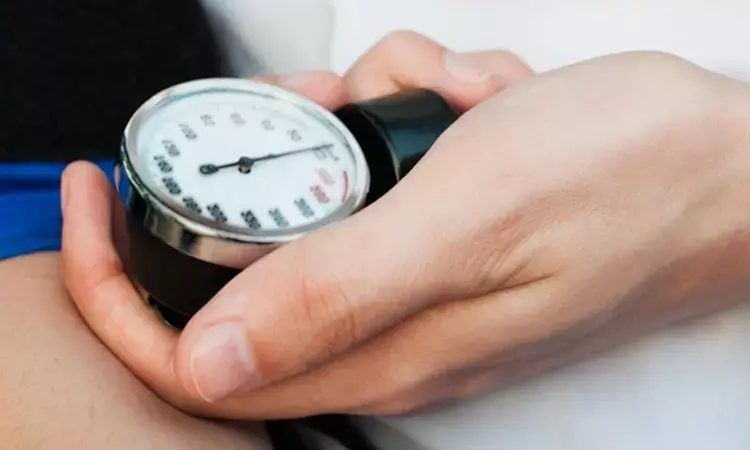- Home
- Medical news & Guidelines
- Anesthesiology
- Cardiology and CTVS
- Critical Care
- Dentistry
- Dermatology
- Diabetes and Endocrinology
- ENT
- Gastroenterology
- Medicine
- Nephrology
- Neurology
- Obstretics-Gynaecology
- Oncology
- Ophthalmology
- Orthopaedics
- Pediatrics-Neonatology
- Psychiatry
- Pulmonology
- Radiology
- Surgery
- Urology
- Laboratory Medicine
- Diet
- Nursing
- Paramedical
- Physiotherapy
- Health news
- Fact Check
- Bone Health Fact Check
- Brain Health Fact Check
- Cancer Related Fact Check
- Child Care Fact Check
- Dental and oral health fact check
- Diabetes and metabolic health fact check
- Diet and Nutrition Fact Check
- Eye and ENT Care Fact Check
- Fitness fact check
- Gut health fact check
- Heart health fact check
- Kidney health fact check
- Medical education fact check
- Men's health fact check
- Respiratory fact check
- Skin and hair care fact check
- Vaccine and Immunization fact check
- Women's health fact check
- AYUSH
- State News
- Andaman and Nicobar Islands
- Andhra Pradesh
- Arunachal Pradesh
- Assam
- Bihar
- Chandigarh
- Chattisgarh
- Dadra and Nagar Haveli
- Daman and Diu
- Delhi
- Goa
- Gujarat
- Haryana
- Himachal Pradesh
- Jammu & Kashmir
- Jharkhand
- Karnataka
- Kerala
- Ladakh
- Lakshadweep
- Madhya Pradesh
- Maharashtra
- Manipur
- Meghalaya
- Mizoram
- Nagaland
- Odisha
- Puducherry
- Punjab
- Rajasthan
- Sikkim
- Tamil Nadu
- Telangana
- Tripura
- Uttar Pradesh
- Uttrakhand
- West Bengal
- Medical Education
- Industry
BP medicines safe with respect to cancer risk: ESC update

Sophia Antipolis, France - Researchers have found in a large study that there was no link between blood pressure medication and cancer.There is no evidence that blood pressure lowering drugs increase the risk of cancer. The late breaking research is presented today at ESC Congress 2020.
A potential link between blood pressure drugs and cancer has been debated for more than 40 years. The evidence for an increased or decreased risk of cancer with the use of antihypertensive medication has been inconsistent and conflicting.
"Our results should reassure the public about the safety of antihypertensive drugs with respect to cancer, which is of paramount importance given their proven benefit for protecting against heart attacks and strokes," said study author Ms. Emma Copland, an epidemiologist at the University of Oxford, UK.
This was the largest study on cancer outcomes in participants of randomised trials investigating antihypertensive medication - around 260,000 people in 31 trials. Investigators of all trials were asked for information on which participants developed cancer. Much of this information has not been published before, making the current analysis the most detailed yet.
Five antihypertensive drug classes were investigated separately: angiotensin-converting enzyme (ACE) inhibitors, angiotensin II receptor blockers (ARBs), beta blockers, calcium channel blockers (CCBs), and diuretics.
The investigators estimated the effect of each drug class on the risk of developing any type of cancer, of dying from cancer, and of developing breast, colorectal, lung, prostate and skin cancers. They also examined whether there were any differences according to age, gender, body size, smoking status and previous antihypertensive medication use before taking part in the trial.
During an average of four years, there were around 15,000 new diagnoses of cancer. The researchers found no evidence that the use of any antihypertensive drug class increased the risk of cancer. This finding was consistent regardless of age, gender, body size, smoking status and previous antihypertensive medication use.
Each drug class was compared against all other control groups, including placebo, standard treatment and other drug classes.
There was no important effect of any individual drug class on overall cancer risk. The hazard ratio (HR) for any cancer was 0.99 (95% confidence interval [CI]) 0.94-1.04) with ACE inhibitors, 0.97 (95% CI 0.93-1.02) with ARBs, 0.98 (95% CI 0.89-1.08) with beta blockers, 1.06 (95% CI 1.01-1.11) with CCBs and 1.01 (95% CI 0.95-1.07) with diuretics. In statistical terms, these effect sizes were not significantly different from each other, so there was no evidence of an increased risk of cancer with any of the drug classes.
Similarly, there was no evidence that any type of antihypertensive medication had an effect on the probability of developing breast, colorectal, lung, prostate or skin cancer.
When participants were followed throughout the course of each trial, there was no indication that the risk of cancer increased with longer duration of use of these treatments.
Ms. Copland said: "Our study has addressed an ongoing controversy about whether antihypertensive medication increases the risk of developing cancer. We used the largest individual-level randomised evidence on antihypertensive medication to date and provide evidence for the safety of blood pressure lowering drugs in relation to cancer."
Source:
European society of cardiology
Dr Kamal Kant Kohli-MBBS, DTCD- a chest specialist with more than 30 years of practice and a flair for writing clinical articles, Dr Kamal Kant Kohli joined Medical Dialogues as a Chief Editor of Medical News. Besides writing articles, as an editor, he proofreads and verifies all the medical content published on Medical Dialogues including those coming from journals, studies,medical conferences,guidelines etc. Email: drkohli@medicaldialogues.in. Contact no. 011-43720751


